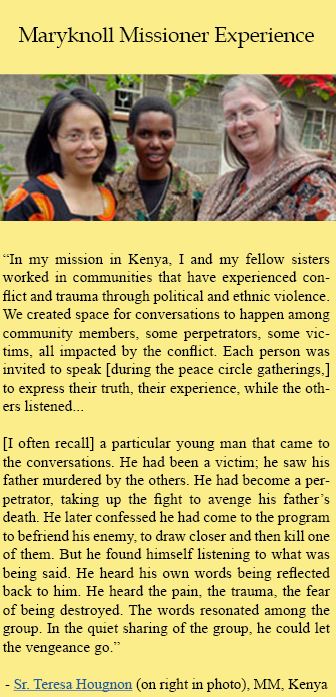Fourth Week of Lent: Living the Truth
Reflect, pray, fast, and act with us for this Fourth Week of Lent.
From the Lenten Reflection Guide 2021: Brothers and Sisters All.
“But whoever lives the truth comes to the light, so that their works may be clearly seen as done in God.”
– John 3: 21
In this week’s Gospel, we hear perhaps the most famous passage from the New Testament: “For God so loved the world that he gave his only Son, that whoever believes in him might not die but have eternal life.” A few lines later we hear, “[Whoever] lives the truth comes to the light, so that their works may be clearly seen as done in God.”
As Christians, we are called to proclaim the truth of God’s love and mercy through our words and deeds. This time, Lent, is when we are invited to step back, remember our call, and ask ourselves whether we are “living the truth.”
In Fratelli Tutti, Pope Francis reminds us that, among many things, “living the truth” of Christ requires being committed to truth, honesty, and integrity as members of society, qualities that are less and less valued, especially in political discourse.
These qualities are what allow for true dialogue – the dialogue that allows for people encounter one another despite their differences and pursue the common good.
Francis reflects on some of the barriers to dialogue in pursuit of truth today: “Dialogue is often confused with something quite different: the feverish exchange of opinions on social networks, frequently based on media information that is not always reliable…Indeed, the media’s noisy potpourri of facts and opinions is often an obstacle to dialogue, since it lets everyone cling stubbornly to his or her own ideas, interests and choices, with the excuse that everyone else is wrong (200).”
He continues, “We need to learn how to unmask the various ways that the truth is manipulated, distorted and concealed in public and private discourse…We need constantly to ensure that present-day forms of communication are in fact guiding us to generous encounter with others, to honest pursuit of the whole truth, to service, to closeness to the underprivileged and to the promotion of the common good (208)“
Similarly, Maryknoll Fr. John Barth reflects, “As a web connects us to others and their ideas, a web can also trap us if we are not careful. Here in Uganda, where I work with refugees from South Sudan, friends often ask me if a certain message, passed on to them through their smart phone, is really true. [Jesus] uses [his] parables to teach us that sometimes things are not what they appear. How do we know the truth from the fake truth? What is news and what is fake news? …Do we have the wisdom and patience needed to avoid being duped?”
This past election season in the U.S. and the violent events leading up to the Inauguration have demonstrated for us the real consequences of failures at truth-telling and genuine dialogue. Maryknoll missioners who have witnessed war, violent conflict, and healing and reconciliation processes around the world know the importance of beginning with the truth – without which it is difficult to move forward.
“Truth, in fact, is an inseparable companion of justice and mercy,” Pope Francis writes. “Truth should not lead to revenge, but rather to reconciliation and forgiveness (227).”
Questions for Reflection:
How can you demonstrate God’s love and mercy through the ways you communicate, including social media?
Pray
A National Examination of Conscience
Do I make an effort to inform myself in a way that is open to truth wherever it may be found, or do I only read opinions and media with which I always agree?
Do I make an effort to find, understand, and read news sources that are objective and follow journalistic standards?
Do I regularly reduce complex issues to simplistic, partisan sound bites to avoid engaging honestly and vulnerably with people with whom I disagree?
Do I speak of my ideological opponents in a way that dehumanizes, stereotypes, or objectifies them? Do I speak scornfully or dismissively of those with whom I disagree rather than engaging with their ideas?
Do I allow feelings of rage, hatred, and bitterness toward those I see as political enemies grow in my heart?
Do I cultivate sin in my heart more than I cultivate virtue?
What are my highest priorities? Where do I direct most of my energies? Do I put living for God first in my life?
– Excerpted from “A National Examination of Conscience in a Divided Time” by Sr. Theresa Aletheia Noble, FSP
Fast
Fast from social media and the rapid consumption of news for a period. Use that space to pray for the world more deeply or to read about an issue from a new angle.
Act
From the International Center for Cooperation and Conflict Resolution at Columbia University, explore this list of U.S. organizations which foster dialogue among people of diverse religious, political, and experiential backgrounds. Consider attending or hosting a dialogue event through one of these organizations. http://bit.ly/3puTfHa
Header photo of lantern available on Unsplash: http://bit.ly/3rgIKYz. Photo of the Maryknoll Sisters’ Kenya Peace Team courtesy of the Maryknoll Sisters.
